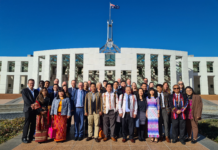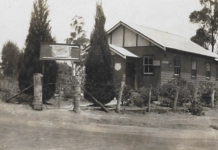
Several years ago, Mark Chapple from Hawkesbury Valley Baptist Church approached me with a vision to equip leaders to serve our churches in the west of Sydney.
He had already begun the process of establishing what would become known as Greater West for Christ (GWFC), a network of churches from Blacktown to Blackheath working together to encourage pastors, work on joint projects and plant new churches. Equipping local leaders — both accredited and lay, part-time and full-time — was essential to that vision. That’s where I came in. Working with Mark, together we developed a partnership between GWFC and Morling College to train leaders from the west for the west and in the west. There is now a dedicated Morling/GWFC learning centre in Cranebrook, near Penrith.
This is a perfect example of the kind of strategic relationships we will need to build if we are to fulfil the vision NSW & ACT Baptists adopted in 2012.
Of course, there has been a similar level of partnership fostered by the H100 vision of the Baptist churches of the Hunter region, which involves the development of one hundred healthy churches across Newcastle and the Hunter. To complete this task existing churches have banded together under Kevin Warner’s leadership to foster greater health in existing churches and to plan for the planting of new churches.
Kel Willis has been hosting a pastors’ network for many years now, featuring regular gatherings and discussions around pertinent issues, as well as mutual prayer, coaching and pastoral care.
Matthew Kuruvilla from Parkside Church recently hosted an important conference on the need for fostering multi-ethnic churches, particularly in the west and south-west of Sydney. While not an exclusively Baptist conference, it nonetheless drew many Baptist leaders together to explore how we can engage missionally within multicultural Australia.
At Morling College such relational networks are our bread and butter. We don’t exist for ourselves, but to serve our family of churches. Therefore, as well as our partnership with GWFC, we have a relationship with Baptist Youth Ministries to conduct Plunge, our gap-year program. We are also in relationship with Global Interaction in training cross-cultural missionaries.
Other Baptist networks are formed not so much around shared goals as they are around shared perspectives. For example, like-minded Calvinist Baptists have united under the “Baptist Evangelicals Today” banner and produce a regular newsletter, The Lever, one I enjoy reading and am regularly stimulated by. And similarly, charismatically inclined Baptists meet together in the “Spirit and Grace” network.
The fostering of strategic and nurturing relationships across churches is essential to our efforts. As the third of our Core Five values states, we need to be committed to “serving each other and working together, honouring the varied expressions of our faith and practice and our cultural diversity, and actively promoting healthy unity through mutual collaboration, transparency and accountability”.
Having said that, there is a danger of becoming so invested in our preferred “tribe” or network that we ignore those who take a different view on theology or who are committed to different goals to us. Of course, we can’t attend every network or every conference that’s going, but I think as a family of churches we do well to remember our common commitments and our common cause — to alert all people to the universal reign of God through Christ. We must be ever on guard against factionalism or schism.
Let me suggest that we need to work hard to foster the following values among our churches:
1. Non-Negotiable Love
Non-negotiable love is being the best expression of Christ to another human being. Putting love first and last in every situation keeps us in the abiding presence of God. It doesn’t mean agreeing with everything the other says or does. But it does mean forging an association that insists on loyalty first and foremost. That kind of love can heal and seal every problem that may occur in any relationship.
2. Relationships of Openness and Honesty
Relationships of openness and honesty allow us to drop the mask and the image we unconsciously present to the world. In this way we live in conscious freedom and joy before people as we do before God. The network of pastors’ accountability groups does this, but I’d love to see them being forged across the expected theological or ecclesiological divides so that we are stretched in our thinking and become practised in accepting others who are different from us.
3. Believe the Best
It is impossible to grow relationships when living in an atmosphere of disapproval. Believing the best about people is not about ignoring their faults but about recognising that everyone wants to change and become like Jesus. We are always a work in progress and therefore deserving of mercy, grace and love. Associated with this should be a desire to cheer each other on to greater faithfulness.
4. Share the Truth in Love , Preceded by Grace
Truth is not just about being right, but also about doing right. Truth given without compassion and love may crush someone. We have all been the object of some harsh criticisms in the past. We might also have dished out our share of criticism to others. But criticism isn’t the problem. It’s the attitude with which it’s shared that causes the hurt. In fact, to be criticised is to be taken seriously. However, we should attempt to present our point of view in love, desiring the best in others.
5. Stewardship Not Ownership
We don’t own our churches or our ministries. They have been granted to us by God who has graciously allowed us to steward the good work he is doing through them. When we adopt a posture of ownership we are much more easily threatened by people who do things differently to us. We feel as though we have to defend our ministries or our churches. Far from it. It is God’s work. As Eugene Petersen says, “Every church is a unique work of the Holy Spirit. Leaders are required to discern what the Spirit is doing and fan it into greater flame.” Stewards hold their ministries lightly, trusting that God’s unique work will be accomplished through them, but not because of them.
When we take these principles seriously there is far less likelihood we will be threatened by each other. We will be freed from the need to correct every point of difference or disassociate from everyone who holds a differing perspective to ours. We will take criticism on board because it will be offered in love by those who have demonstrated their loyalty to us.
Mark Chapple and his church, Hawkesbury Valley Baptist Church, would probably identify themselves as charismatic in their theology. I would not. And yet our partnership in the Morling/GWFC project and our ongoing association as brothers in Christ have created a deep and abiding bond. I know Mark has my back. I know he prays for me every Wednesday morning. There is loyalty, love, respect and partnership. I am richer for it. And it is not based on us agreeing with each other on every point of theology and practice.
Likewise, I enjoy an encouraging and stimulating partnership with several of my colleagues at Morling who would identify themselves as Calvinists. As much as our students sometimes try to play us off against each other, we refuse to do anything other than publicly support each other, even while respectfully disagreeing.
As Baptists we are a diverse bunch within the spectrum of evangelical thought and practice, and we are better together, encouraging each other, spurring each other on, and hopefully highlighting the excesses and blindspots in our thinking.




































